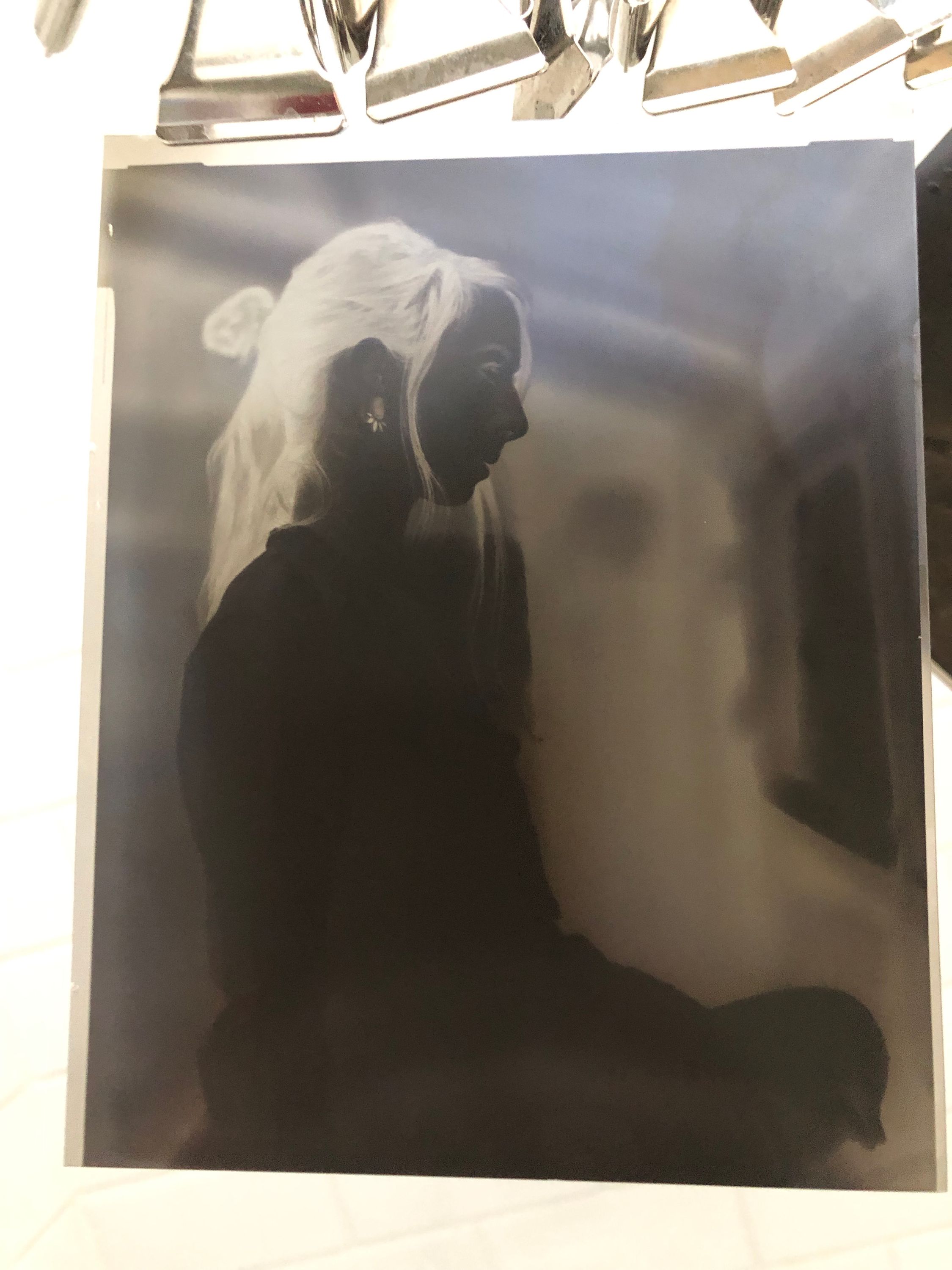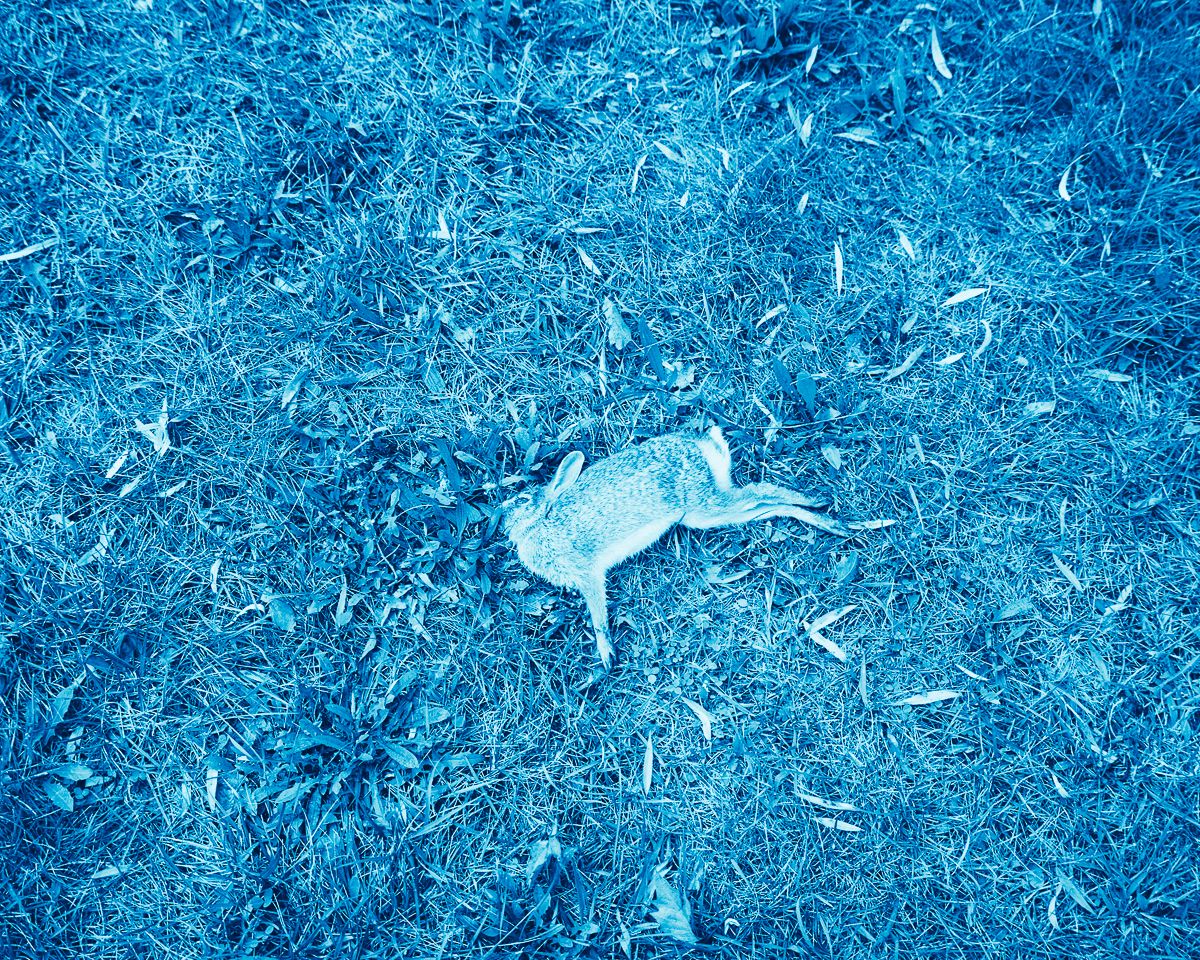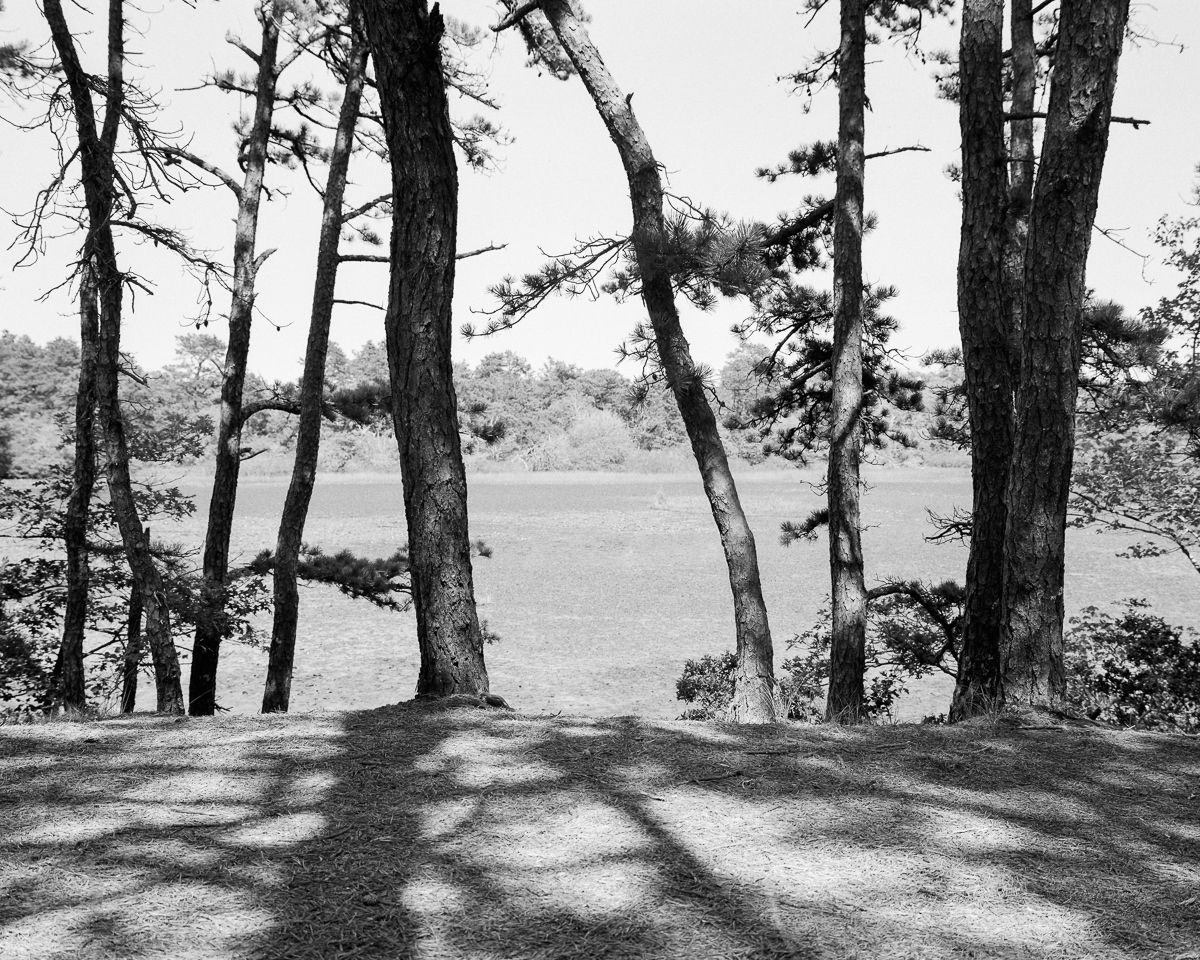
This sequence is my heart laid bare and how! Some will realize that it is done for the love of God. Most will think it sentimental and for the love of the flesh. But that I cannot help. Maybe it will be beautiful to a few borderline cases and who because of the sequence will realize for the first time that a love of God can grow out of a love for the flesh.
- Minor White, from Memorable Fancies, 1956

Did a trial run of pyro developing using Pyrocat HD on some 4x5 negatives today.
Notes:
- HP5+, exposed at ~ASA 320
- Developing temp: 72˚F
- Presoak: 5m
- Pyrocat formula: 2:2:100 (9ml A - 9ml B - 450ml water)
- Agitation (“minimal”): 60 seconds, followed by 5 inversions every 3 minutes
- Developing time: 28m (50% increase from normal agitation version) - CI 0.8
- Water stop bath, 2m
- Ilford Rapid Fix, 9:1, 5m, 2-bath version
Plan to print cyanotypes with these later today. You definitely can see the staining that pyro is supposed to provide.

I made a Lightroom preset to help visualize what I might get from a cyanotype of my digital files. Maybe someone else might find it useful, so here it is.
Arren was silent, pondering this. Presently the mage said, speaking softly, “Do you see, Arren, how an act is not, as young men think, like a rock that one picks up and throws, and it hits or misses, and that’s the end of it. When that rock is lifted, the earth is lighter; the hand that bears it heavier. When it is thrown, the circuits of the stars respond, and where it strikes or falls the universe is changed. On every act the balance of the whole depends. The winds and seas, the powers of water and earth and light, all that these do, and all that the beasts and green things do, is well done, and rightly done. All these act within the Equilibrium. From the hurricane and the great whale’s sounding to the fall of a dry leaf and the gnat’s flight, all they do is done within the balance of the whole. But we, insofar as we have power over the world and over one another, we must learn to do what the leaf and the whale and the wind do of their own nature. We must learn to keep the balance. Having intelligence, we must not act in ignorance. Having choice, we must not act without responsibility. Who am I—though I have the power to do it—to punish and reward, playing with men’s destinies?”
“But then,” the boy said, frowning at the stars, “is the balance to be kept by doing nothing? Surely a man must act, even not knowing all the consequences of his act, if anything is to be done at all?”
“Never fear. It is much easier for men to act than to refrain from acting. We will continue to do good and to do evil…But if there were a king over us all again and he sought counsel of a mage, as in the days of old, and I were that mage, I would say to him: My lord, do nothing because it is righteous or praiseworthy or noble to do so; do nothing because it seems good to do so; do only that which you must do and which you cannot do in any other way.”
Ursula Le Guin, The Farthest Shore, p. 66-7
A list written by Jack Kerouac, allegedly tacked to the wall in Allen Ginsberg’s hotel room in North Beach a year before he wrote “Howl”:
1 Scribbled secret notebooks, and wild typewritten pages, for yr own joy
2 Submissive to everything, open, listening 3 Try never get drunk outside yr own house
4 Be in love with yr life
5 Something that you feel will find its own form
6 Be crazy dumbsaint of the mind
7 Blow as deep as you want to blow
8 Write what you want bottomless from bottom of the mind
9 The unspeakable visions of the individual
10 No time for poetry but exactly what is
11 Visionary tics shivering in the chest
12 In tranced fixation dreaming upon object before you
13 Remove literary, grammatical and syntactical inhibition
14 Like Proust be an old teahead of time
15 Telling the true story of the world in interior monolog
16 The jewel center of interest is the eye within the eye
17 Write in recollection and amazement for yourself
18 Work from pithy middle eye out, swimming in language sea
19 Accept loss forever
20 Believe in the holy contour of life
21 Struggle to sketch the flow that already exists intact in mind
22 Dont think of words when you stop but to see picture better
23 Keep track of every day the date emblazoned in yr morning
24 No fear or shame in the dignity of yr experience, language & knowledge
25 Write for the world to read and see yr exact pictures of it
26 Bookmovie is the movie in words, the visual American form
27 In praise of Character in the Bleak inhuman Loneliness
28 Composing wild, undisciplined, pure, coming in from under, crazier the better
29 You’re a Genius all the time
30 Writer-Director of Earthly movies Sponsored & Angeled in Heaven
(h/t - brainpickings.org)
Postscript
And some time make the time to drive out west
Into County Clare, along the Flaggy Shore,
In September or October, when the wind
And the light are working off each other
So that the ocean on one side is wild
With foam and glitter, and inland among stones
The surface of a slate-grey lake is lit
By the earthed lightning of a flock of swans,
Their feathers roughed and ruffling, white on white,
Their fully grown headstrong-looking heads
Tucked or cresting or busy underwater.
Useless to think you’ll park and capture it
More thoroughly. You are neither here nor there,
A hurry through which known and strange things pass
As big soft buffetings come at the car sideways
And catch the heart off guard and blow it open.
- Seamus Heaney
Drop count/paper coating cheat sheet
1 drop per 2 square inches
20 drops = 1 ml
4 x 5 inch print = 10 drops = 1/2 ml (0.3-0.4 ml using a glass rod) 8 x 10 inch print = 40 drops = 2 ml (1.5 ml with glass rod)
The poignancy of the photograph comes from looking back to a fleeting moment in a floating world. The transitoriness is what creates the sense of the sacred.
ALLEN GINSBERG
I’ve been working with cyanotype toning baths awhile now, and while I haven’t figured out which ones work best or which one(s) I prefer, I have some basic approaches I’ve locked down.
Bleaching/redevelopment:
For the most part, I prefer the effects you get when you first bleach back the print, either for a short while (just until the shadows go from blue to purple, 30-60s) or for a long time (until the image fades to a pale brown/yellow and only the deepest shadows remain a faint gray/blue). Toning without bleaching is very slow and as a result the paper/highlights stain more than I’d like.
Light bleaching results in much of the blue remaining in place, so that the toning happens over it. Heavy bleaching replaces the blue with another color. It can be disconcerting to watch the image fade away, but it’s equally thrilling to watch it come back—often very quickly—once it hits the toning bath.
So far I’ve only tested sodium carbonate bleaching, I still need to test whether ammonia or other alkali work better/differently.
Bleach concentrations:
| Short |
Na2CO3 |
1 |
30-60s |
| Long |
Na2CO3 |
4 |
5-7m |
Toning baths:
| Instant Coffee (Nescafe) |
8 |
navy/slate/gray |
none |
Dissolved in 180F water, remaining water added to cool |
| Green Tea (sencha) |
4 |
blue/violet |
mild |
Steeped in 180F water for 10m, remaining water added to cool |
| Black Tea (English breakfast) |
4 |
Dark blue/violet |
heavy |
Steeped in 180F water for 10m, remaining water added to cool |
| Wine Tannin (home-brew grade) |
2 |
eggplant black |
mild |
Dissolved in 180F water, aged overnight |
Some preliminary color notes:
- Instant coffee gives muted tones. If bleaching is mild, the coffee tames the blues to a deeper navy. Longer bleaching gives slate blue tones. However, if you bleach back the image to yellow, it never fully recovers, and you end up with a faint gray/brown image. Coffee doesn’t stain the paper much at all, which is nice.
- Green tea can vary widely. With mild bleaching, it give a split tone, turning the shadows purple black and the highlights rose gray. More bleaching can make the final image eggplant black. Green tea doesn’t stain much at all.
- Black tea seems similar to green so far, though it stains the paper quite brown, which does make the end result look quite different.
- Wine tannin is the quickest way to a pure eggplant black. Unlike tea, it’s more pure in color. And it doesn’t stain the paper much either.
Method:
Timings vary, but my current MO (working with prints that have been dried and aged at least overnight) is:
- Prewet print 5m
- Bleach (short/long)
- 3x wash
- Tone until desired color achieved (10 to 60m)
- Wash until water runs clear
Another method I have tested is this one (found here):
- Prewet 24h aged print 5m
- Tone until the highlights go tan (5-10m)
- 3x wash
- Bleach until shadows go purple (30-60 seconds)
- 3x wash
- Soak in weak hydrogen peroxide solution for 30 seconds
- Return to toner until shadows go black (~15 minutes)
- Wash until water runs clear
Some possibly useful web links about cyanotype toning:
https://mpaulphotography.wordpress.com/2011/04/01/cyanotype-toning-the-basics/
https://mpaulphotography.wordpress.com/2010/10/28/green-tea-the-cyanotype-super-toner/
https://mpaulphotography.wordpress.com/2011/03/04/cyanotype-toning-wine-tannin/
https://mpaulphotography.wordpress.com/2010/07/16/coffee-is-actually-useful/
http://grahamp.dotinthelandscape.org/cyanotype.html
http://artandwater.blogspot.com/2012/08/12-different-cyanotype-tones-compared.html
http://www.co-mag.net/2007/ammonia-cyanotype-toning/
http://berk-edu.com/HYB_subsite/PDF_hyb/ToningWithTea.pdf
https://grafikskolen.dk/cyanotype-toning/
https://en.wikipedia.org/wiki/Tannin
These are the Caffenol formulas I’m currently using for both film and paper developing. The ingredients should be dissolved one at a time in half the final volume of water, then the remainder of water added.
Film:
| Na2CO3 |
54g |
| Ascorbic Acid (Vitamin C) |
16g |
| KBr (for 400 speed films or higher) |
1g |
| Instant coffee |
40g |
Process: 15m development at 68F.
Paper (mostly Harman Direct Positive):
| Na2CO3 |
80g |
| Ascorbic Acid |
4g |
| Instant coffee |
40g |
Process: 2-5m in developer, 30 seconds water stop bath, 60 seconds in paper fixer, wash 3x, 2m Permawash, 3x wash (5m each; sometimes I have to soak them longer to get the pink/brown staining out).
Also, this PDF is a useful thing to keep handy:
I can never remember how much area each format of film covers, which is a useful bit of information to have when you are keeping track of how many “rolls” you’ve run through a batch of chemicals (monobath, for example).
So here it is:
1 roll 36 exposure 35mm film
= 1 roll 120 film
= 4 sheets 4x5 film
= 1 sheet 8x10 film
I’ve been using Cinestill D96 Monobath for black and white film developing recently. I still think Caffenol is the better option in terms of environmental safety, but the convenience and speed of a monobath can’t be beat: 8 minutes to develop and fix film, followed by 3 quick rinses and a short soak in distilled water/rinse-aid and you are done.
It’s temperature-sensitive, so you need to warm it up first, but even so you can realistically develop, fix, and archivally wash BW film in less than a half hour.
And as far as I can tell there is no downside, aside from the cost (~$20 per liter, which can develop 16 rolls of 35mm or 120 film, or 64 sheets of 4x5 film), and the need to dispose of it safely somewhere once it is exhausted. I think the negs look just peachy.
I mainly shoot HP5—rated at asa 200—these days, so the method I use is this one (after pre-wetting for 5 minutes in water at the same temperature as the monobath):
normal development: 75˚F for 8 minutes*, with minimal agitation†
pushed/higher-contrast (for alt pro contact printing): 83˚F for 8 minutes
*As per the monobath instructions, you are supposed to add 15 seconds per previous roll developed to the 6 minute minimum processing time to account for the gradual degradation of the fixer, but only up to 8 minutes total. I just simplify things by developing all rolls for 8 minutes.
†My approach is slightly different than Cinestill’s: Agitate gently and constantly for the first 30 seconds, followed by 5 inversions at the top of every minute.
A photograph or a collection of photographs that ignores its usual objective is equally perverted. Perverted photography doesn’t sell a product or communicate a message. It’s not meant to be decoded, but to keep you in the process of looking. It’s layered and complex. It mirrors and triggers you without end and for no good reason, and that is erotic.
- Torbjørn Rødland
I need to get back to this blog, particularly posts where I actually write things. I spend a fair bit of time keeping notes on photographic processes I am trying to get a handle on, with the end goal of locking down a reliable method, and to create ‘cheat sheets’ to have handy when I return to them. But most of the time these notes end up unorganized and unarticulated (oftentimes I go back to the last or best example of a practice to see how I made it). I tell myself I need to create my cheat sheet, but rarely do.
So my idea is to post them here instead. Not for the primary purpose of sharing it with anyone else, but rather to stash my own set of instructions in a public place. I’m not even sure why I think so, but somehow I have the sense that writing things down publicly is more motivating than simply keeping notes in a private notebook or text file.
In the artist of all kinds I think one can detect an inherent dilemma, which belongs to the coexistence of two trends, the urgent need to communicate and the still more urgent need not to be found.
D. W. Winnicott

Provincetown, MA. August, 2018.
Look, the trees
are turning
their own bodies
into pillars
of light,
are giving off the rich
fragrance of cinnamon
and fulfillment,
the long tapers
of cattails
are bursting and floating away over
the blue shoulders
of the ponds,
and every pond,
no matter what its
name is, is
nameless now.
Every year
everything
I have ever learned
in my lifetime
leads back to this: the fires
and the black river of loss
whose other side
is salvation,
whose meaning
none of us will ever know.
To live in this world
you must be able
to do three things:
to love what is mortal;
to hold it
against your bones knowing
your own life depends on it;
and, when the time comes to let it go,
to let it go.
— “In Blackwater Woods”, by Mary Oliver
Sentences on Photography by Torbjørn Rødland
- The muteness of a photograph matters as much as its ability to speak.
- The juxtaposition of photographs matters as much as the muteness of each.
- All photography flattens. Objectification is inescapable.
- Photography cannot secure the integrity of its subject any more than it can satisfy the need to touch or taste.
- Good ideas are easily bungled.
- Banal ideas can be rescued by personal investment and beautiful execution.
- Lacking an appealing surface, a photograph should depict surfaces appealingly.
- A photograph that refuses to market anything but its own complexities is perverse. Perversion is bliss.
- A backlit object is a pregnant object.
- To disregard symbols is to disregard a part of human perception.
- Photography may employ tools and characteristics of reportage without being reportage.
- The only photojournalistic images that remain interesting are the ones that produce or evoke myths.
- A photographer in doubt will get better results than a photographer caught up in the freedom of irony.
- The aestheticizing eye is a distant eye. The melancholic eye is a distant eye. The ironic eye is a distant eye.
- One challenge in photography is to outdistance distance. Immersion is key.
- Irony may be applied in homeopathic doses.
- A lyrical photograph should be aware of its absurdity. Lyricism grows from awareness.
- For the photographer, everyone and everything is a model, including the photograph itself.
- The photography characterized by these sentences is informed by conceptual art.
- The photography characterized by these sentences is not conceptual photography.
So this blog has its first confirmed reader, which means I ought to post more regularly again. Which I will do soon. Lots of things cooking these days, especially in the cyanotype arena.
Oh, what a catastrophe, what a maiming of love when it was made personal, merely personal feeling, taken away from the rising and setting of the sun and cut off from the magic connection of the solstice and the equinox! This is what is the matter with us, we are bleeding at the roots, because we are cut off from the earth and sun and stars, and love is a grinning mockery, because, poor blossom, we plucked it from its stem on the tree of Life, and expected it to keep blooming in our civilized vase on the table.
DH Lawrence
dehisce de·hisce | -ˈhis dehisced; dehiscing
- intransitive verb
- to split along a natural line also : to discharge contents by so splitting Ex: “seedpods dehiscing at maturity”
View the archives



